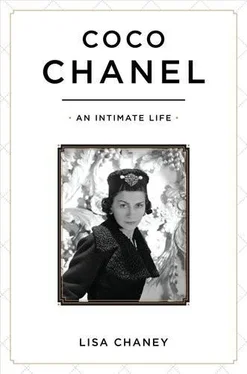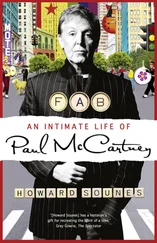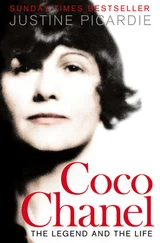Her solitude had deepened even further with the deaths of her oldest friends and ex-lovers. Hardly had the war ended than José Maria Sert had gone. Then, in 1950, Misia, whom she had loved, and hated, for so many years, and who knew so many of Gabrielle’s secrets that they had both long since dispensed with any pretense. In 1953, the Duke of Westminster, with whom, as with Dmitri Pavlovich, Gabrielle had always remained on close terms, died of a heart attack after only six years of his final and happiest marriage. The sympathetic, horse-mad Etienne Balsan, who had recognized that, in Sachs’s words, “Her spirit and her heart were unforgettable,” had rescued Gabrielle from her servitude, and died in South America. Following his daughter’s marriage and move to Rio de Janeiro, Etienne had gone there, too. His wish to die quickly had been answered when he was run over by a bus, in 1954.
When Adrienne de Nexon (née Chanel) died, in 1955, she took to her grave the most intimate details and appreciation of Gabrielle’s background. At Solesmes, in 1960, when Pierre Reverdy, the man for whom Coco “would have gladly given up everything,” died, only his wife and the monks were present at his simple funeral. As with all the rest, Gabrielle only heard about it through the papers. In 1963, Jean Cocteau, whom she had supported and denigrated for more than half a century, died, too. And on Pierre Wertheimer’s passing, in 1965, she lost the man who for so long had fulfilled for her the stimulating role of beloved adversary. In 1969, the aging Paul Morand would write in his journal: “We are the last ones, the survivors. We talk of people, of stories which only Cocteau, Poulenc, Radiguet, Etienne de Beaumont, Misia could understand. Only Chanel remains.” 13
In 1960, when Gabrielle’s favorite, Marie-Hélène Arnaud, had been employed by her for six years, she told Gabrielle that she didn’t want to be a model forever. Gabrielle tried to keep her by hiring her father, an academic, at a huge salary. Apparently, M. Arnaud had heard that Marie-Hélène was going to be made director of Chanel and would need help. In the hope of dissuading Marie-Hélène from leaving, Gabrielle had hinted at this herself. Marie-Héléne said she felt no animosity toward Gabrielle: “I loved Coco… it never crossed my mind that someday I would replace her.” But Gabrielle was unconvinced, felt threatened and when the young woman did leave — her father followed soon after — Gabrielle spoke ill of them, hurt at what felt like rejection by the lovely Marie-Hélène. Gabrielle turned a good many friends away in these years in a similarly unjust fashion; a few, such as Serge Lifar, put up with her inconstancy, although even he tended to see her less.
As a solace, during these years, Gabrielle came to rely much on her small group of younger friends and assistants. These included her butler, Jean Mironnet—“François,” as she called him — and two or three young women. François, the son of Norman peasants from Cabourg, was a man who didn’t speak too much, and unlike Gabrielle’s more sophisticated and better informed friends, there was much she could teach him. Whatever his private thoughts, François looked up to her, and a few years before her death, Gabrielle promoted him as a kind of companion. He was often by her side, sat silently behind as she worked on her collections. He kept her pills and gave her the water to take them with, was ready to help if she needed an arm on the stairs, remembered anything she might have forgotten. He was invited to eat with her and accompanied her when she traveled, now only to Switzerland. “Monsieur François” was Gabrielle’s “quiet gentleman-in-waiting,” who did his best to make sure she was rarely alone.
Aside from her models, the significant young women in Gabrielle’s life were her great-niece, Gabrielle (Labrunie); Claude Delay, daughter of the psychiatrist Jean Delay; and Lilou Grumbach (née Marquand), Gabrielle’s assistant from the late fifties onward. Lilou Marquand’s actor brother was Christian Marquand, friend to Roger Vadim. He was also friend to the Mille brothers, Paris Match editor Hervé and interior designer Gérard. (The Milles’ rue de Varennes apartment was one of the most powerful postliberation Parisian salons, and Gabrielle felt at home there. Hervé and Gérard were old friends who had known her since 1935, and Hervé regularly did “battle on her behalf.”) Lilou Marquand, meanwhile, had made a botched attempt at meeting Gabrielle, and asked the Mille brothers for their help. They told her they were going to dinner with Gabrielle that very evening; why didn’t she come along? Someone mentioned to Gabrielle that Lilou would like to work for her, but she made no comment. Then, as everyone was leaving, she said to Lilou, “You’re starting on Monday.”
After Marie-Hélène Arnaud’s departure, Lilou found herself being taken more into Gabrielle’s confidence. In theory, her job was handling press and public relations; in practice, her role was far more extensive than that. Among other duties, she acquired responsibility for photo shoots and was in charge of the dressing rooms, the cabines . Seeing Gabrielle almost every working day for the last fourteen or so years of her life, Lilou came to know her well. She was strong enough to withstand Gabrielle’s rages and outspokenness, and while remaining an employee, she also became an intimate. In an interview with the author recently, she laughed and said, “We used to shout at one another. She would scream. You could hear everything we said downstairs, but she’d reply: “I don’t give a damn!” Lilou lost track of how many times over the years Gabrielle had sacked her.
As the sixties had worn on, by day, Gabrielle remained indomitable. As her friend Claude Delay says, she was “very strong, very violent, not a sweet little character. She was a force. She was exigent. Demanding of herself and of others.” 14However, in quieter moments, and by night, Gabrielle’s vulnerability had grown more disabling. When the end of each working day forced her to halt for the rest she sorely needed, she was increasingly defenseless against the sense of abandonment that now overcame her each night on finding herself alone. The mark left by her mother’s emotional and physical frailty had not equipped Gabrielle with that specific emotional strength required to come to terms with her father’s abandonment, and it had lain unresolved. In this way, throughout her life, Gabrielle had suffered inordinately when she felt herself “left,” be it by man or woman, in life or through death. Her strength of character had enabled her to survive, but without the emotional tools to face her demons, with time they had grown more frightening. Lilou Marquand would say:
Chanel was everything but serene. After the throes of work came what she called “the evening’s anguish.” Once the sun had set, and the rue Cambon had emptied, she felt powerless, almost without personality: in the now silent hive she remained alone with the guard. Her helplessness was so deep and so moving that I acquired the habit of staying there for dinner once or twice a week. 15
Claude Delay tells how Gabrielle would say, “I’ve wept so much, now I don’t cry any more. When one doesn’t cry any more it’s because one no longer believes in happiness.” But she said this because she loved romance. And secretly she always hoped that it might happen. She was always waiting for something to happen… But it never did.” 16
Lilou Marquand, too, witnessed Gabrielle’s fantasies, her dreams of an ideal man, and heard stories about Gabrielle’s father as the personification of this ideal. On other occasions, he was a wastrel and drunkard. Lilou tells how “in some ways Chanel had remained very romantic. She liked handsome, tall strong men. When she saw one in the street she always said, “You see, he’s probably someone wonderful.” She had spent some of her best moments in their company and she couldn’t get used to their absence. “From time to time I need to rest my head on a shoulder. Too bad I don’t have that, too bad. It doesn’t matter.” 17But of course it did. Gabrielle would say, “When men were strong, they were chaste and gentle… Tenderness is strength watching over you.” 18And Claude Delay recalled an episode that had touched Gabrielle deeply when witnessing that tenderness she had lost and for which, above all, she longed. Returning to the Ritz one evening:
Читать дальше












